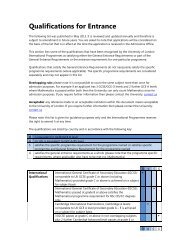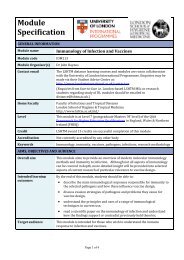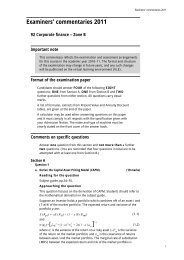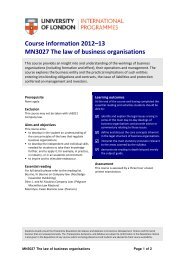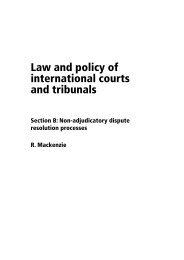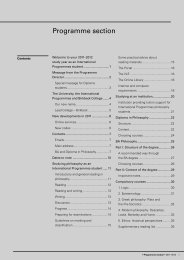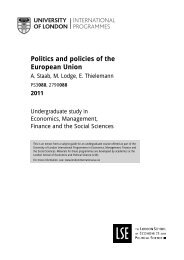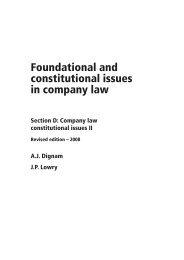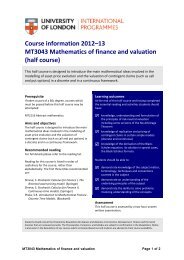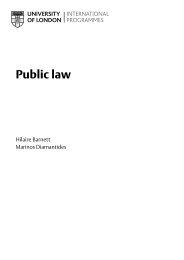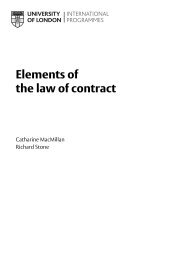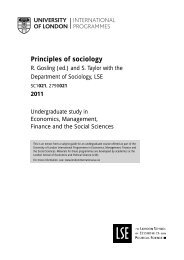Introduction to computer systems architecture and programming
Introduction to computer systems architecture and programming
Introduction to computer systems architecture and programming
Create successful ePaper yourself
Turn your PDF publications into a flip-book with our unique Google optimized e-Paper software.
168 <strong>Introduction</strong> <strong>to</strong> <strong>computer</strong> <strong>systems</strong> <strong>architecture</strong> <strong>and</strong> <strong>programming</strong><br />
6<br />
Online study resources<br />
In addition <strong>to</strong> the subject guide <strong>and</strong> the Essential reading, it is crucial that<br />
you take advantage of the study resources that are available online for this<br />
course, including the VLE <strong>and</strong> the Online Library.<br />
You can access the VLE, the Online Library <strong>and</strong> your University of London<br />
email account via the Student Portal at:<br />
http://my.londoninternational.ac.uk<br />
You should have received your login details for the Student Portal with<br />
your official offer, which was emailed <strong>to</strong> the address that you gave<br />
on your application form. You have probably already logged in <strong>to</strong> the<br />
Student Portal in order <strong>to</strong> register! As soon as you registered, you will<br />
au<strong>to</strong>matically have been granted access <strong>to</strong> the VLE, Online Library <strong>and</strong><br />
your fully functional University of London email account.<br />
If you forget your login details at any point, please email uolia.support@<br />
london.ac.uk quoting your student number.<br />
The VLE<br />
The VLE, which complements this subject guide, has been designed <strong>to</strong><br />
enhance your learning experience, providing additional support <strong>and</strong> a<br />
sense of community. It forms an important part of your study experience<br />
with the University of London <strong>and</strong> you should access it regularly.<br />
The VLE provides a range of resources for EMFSS courses.<br />
• Self-testing activities: Doing these allows you <strong>to</strong> test your own<br />
underst<strong>and</strong>ing of subject material.<br />
• Electronic study materials: The printed materials that you receive from<br />
the University of London are available <strong>to</strong> download, including updated<br />
reading lists <strong>and</strong> references.<br />
• Past examination papers <strong>and</strong> Examiners’ commentaries: These provide<br />
advice on how each examination question might best be answered.<br />
• A student discussion forum: This is an open space for you <strong>to</strong> discuss<br />
interests <strong>and</strong> experiences, seek support from your peers, work<br />
collaboratively <strong>to</strong> solve problems <strong>and</strong> discuss subject material.<br />
• Videos: There are recorded academic introductions <strong>to</strong> the subject,<br />
interviews <strong>and</strong> debates <strong>and</strong>, for some courses, audio-visual tu<strong>to</strong>rials<br />
<strong>and</strong> conclusions.<br />
• Recorded lectures: For some courses, where appropriate, the sessions<br />
from previous years’ study weekends have been recorded <strong>and</strong> made<br />
available.<br />
• Study skills: Expert advice on preparing for examinations <strong>and</strong><br />
developing your digital literacy skills.<br />
• Feedback forms.<br />
Some of these resources are available for certain courses only, but we<br />
are exp<strong>and</strong>ing our provision all the time <strong>and</strong> you should check the VLE<br />
regularly for updates.<br />
Making use of the Online Library<br />
The Online Library contains a huge array of journal articles <strong>and</strong> other<br />
resources <strong>to</strong> help you read widely <strong>and</strong> extensively.<br />
To access the majority of resources via the Online Library you will either<br />
need <strong>to</strong> use your University of London Student Portal login details, or you



